-
 Bitcoin
Bitcoin $82,566.4689
0.19% -
 Ethereum
Ethereum $1,779.6850
-0.10% -
 Tether USDt
Tether USDt $0.9998
0.03% -
 XRP
XRP $2.0537
2.55% -
 BNB
BNB $589.8188
0.52% -
 USDC
USDC $0.9998
-0.02% -
 Solana
Solana $114.9791
0.70% -
 Dogecoin
Dogecoin $0.1641
4.11% -
 TRON
TRON $0.2412
4.15% -
 Cardano
Cardano $0.6353
1.62% -
 UNUS SED LEO
UNUS SED LEO $9.3746
0.37% -
 Toncoin
Toncoin $3.3731
-6.60% -
 Chainlink
Chainlink $12.5493
0.78% -
 Stellar
Stellar $0.2565
1.09% -
 Avalanche
Avalanche $17.9347
0.40% -
 Sui
Sui $2.2010
-1.94% -
 Shiba Inu
Shiba Inu $0.0...01213
1.26% -
 Hedera
Hedera $0.1617
3.48% -
 Polkadot
Polkadot $4.0354
3.83% -
 Litecoin
Litecoin $82.6619
2.07% -
 MANTRA
MANTRA $6.3054
0.41% -
 Bitcoin Cash
Bitcoin Cash $299.2804
0.17% -
 Bitget Token
Bitget Token $4.4878
-0.11% -
 Dai
Dai $1.0000
0.01% -
 Ethena USDe
Ethena USDe $0.9995
-0.01% -
 Monero
Monero $214.7676
1.57% -
 Hyperliquid
Hyperliquid $11.4665
1.19% -
 Uniswap
Uniswap $5.7693
0.41% -
 Pi
Pi $0.5195
-7.75% -
 NEAR Protocol
NEAR Protocol $2.4505
2.02%
How do NFT Ethical Considerations reflect the social impact of NFTs?
NFTs offer creators empowerment and fundraising potential, but ethical concerns about environmental impact, intellectual property, scams, accessibility, and inclusivity require careful consideration for responsible development.
Mar 02, 2025 at 12:48 pm
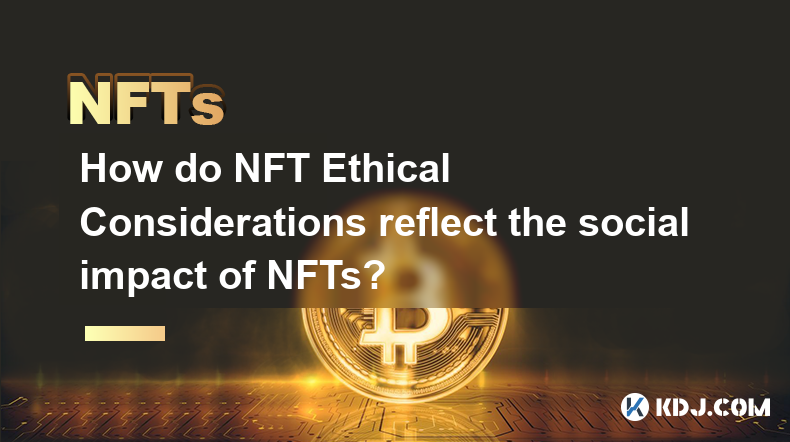
Key Points:
- NFTs' environmental impact due to energy consumption in blockchain networks.
- The ethical concerns surrounding NFT ownership and intellectual property rights.
- The potential for NFT scams and market manipulation.
- The role of NFTs in promoting digital art and creator empowerment.
- The accessibility and inclusivity issues related to NFT adoption.
- The use of NFTs in charitable initiatives and social good projects.
How do NFT Ethical Considerations reflect the social impact of NFTs?
The burgeoning world of Non-Fungible Tokens (NFTs) presents a complex interplay of technological innovation and ethical dilemmas, significantly impacting society. Understanding these ethical considerations is crucial to navigating the social implications of this rapidly evolving space.
Environmental Impact:
One major ethical concern revolves around the environmental impact of NFTs, particularly those minted on energy-intensive proof-of-work blockchains like Ethereum. The substantial energy consumption for transaction processing contributes to carbon emissions, raising concerns about sustainability and its impact on climate change. This environmental cost directly impacts society's efforts towards greener technologies and a sustainable future.
Intellectual Property and Ownership:
The concept of ownership within the NFT space raises significant ethical questions. While NFTs grant verifiable ownership of a digital asset, the underlying intellectual property rights can be complex and often unclear. This can lead to disputes and legal challenges, particularly regarding the rights of artists and creators, and potentially hindering creative expression.
Scams and Market Manipulation:
The NFT market has witnessed numerous instances of scams and market manipulation. The decentralized and often unregulated nature of the space makes it susceptible to fraudulent activities, resulting in financial losses for unsuspecting investors and eroding public trust. This negatively impacts the overall perception and adoption of NFTs.
Creator Empowerment and Digital Art:
Despite the challenges, NFTs offer a powerful tool for empowering digital artists and creators. They provide a new avenue for monetizing their work, bypassing traditional gatekeepers and directly connecting with their audience. This can revolutionize the art market and promote greater creative freedom. However, the distribution of wealth within this system remains a key ethical consideration.
Accessibility and Inclusivity:
The high transaction fees and technical barriers associated with NFTs create accessibility issues, potentially excluding many individuals from participating in this emerging market. This lack of inclusivity can exacerbate existing social inequalities, limiting the benefits of NFT technology to a privileged few.
NFTs and Social Good:
Conversely, NFTs are also being used for charitable initiatives and social good projects. Organizations are leveraging NFTs to raise funds for various causes, offering unique digital collectibles to supporters. This demonstrates the potential of NFTs to drive positive social change, although careful consideration is needed to ensure transparency and accountability in such ventures.
NFTs and Decentralization:
The inherent decentralization of NFTs presents both opportunities and challenges. While it promises greater autonomy and reduces reliance on intermediaries, it also raises concerns about governance, regulation, and the potential for misuse. Balancing decentralization with accountability remains a critical ethical consideration.
The Future of NFTs and Ethics:
The ethical considerations surrounding NFTs are constantly evolving. As the technology matures and the market develops, it's crucial to engage in ongoing discussions and establish clear guidelines to address these challenges. This includes promoting transparency, fostering responsible innovation, and ensuring equitable access to the benefits of NFT technology.
Common Questions and Answers:
Q: What is the biggest ethical concern regarding NFTs?
A: The most significant ethical concern is likely the environmental impact due to high energy consumption in some blockchain networks used for minting NFTs. Other key concerns include intellectual property rights, scams, market manipulation, and accessibility issues.
Q: How can the environmental impact of NFTs be mitigated?
A: Moving to more energy-efficient blockchain networks (proof-of-stake), utilizing carbon offsetting initiatives, and developing more sustainable minting processes are all potential solutions.
Q: What are the potential benefits of NFTs for artists?
A: NFTs can provide artists with direct access to their audience, enabling them to bypass traditional gatekeepers and retain a larger share of profits from their work.
Q: How can we address the issue of scams and market manipulation in the NFT space?
A: Increased regulatory oversight, improved authentication mechanisms, and greater community awareness are crucial steps to combat scams and market manipulation.
Q: Are NFTs truly accessible to everyone?
A: Currently, no. High transaction fees, technical complexity, and a lack of digital literacy create significant barriers to entry for many individuals.
Q: What is the role of NFTs in promoting social good?
A: NFTs can be utilized for fundraising, community building, and supporting charitable causes, providing a new avenue for donations and engagement. However, transparency and accountability are crucial.
Disclaimer:info@kdj.com
The information provided is not trading advice. kdj.com does not assume any responsibility for any investments made based on the information provided in this article. Cryptocurrencies are highly volatile and it is highly recommended that you invest with caution after thorough research!
If you believe that the content used on this website infringes your copyright, please contact us immediately (info@kdj.com) and we will delete it promptly.
- Dogecoin Price Soared Over 2% Today, Indicating a Renewed Market Interest in the Leading Meme Coin
- 2025-04-04 21:10:12
- Filecoin FIL $2.76 24h volatility: 2.9% Market cap: $1.79 B Vol. 24h: $489.77 M
- 2025-04-04 21:10:12
- The latest Dogecoin price prediction is raising eyebrows
- 2025-04-04 21:05:12
- With meme coins like Pepe and Shiba Inu back in the spotlight, traders are wondering which token could deliver the biggest gains this week
- 2025-04-04 21:05:12
- Market expert Ali Martinez estimates that the price of this dog-themed meme coin has the potential to surge by around 250% to touch the $0.5 level
- 2025-04-04 21:00:12
- Ethereum (ETH) price plunges further as investors limit their risk exposure
- 2025-04-04 21:00:12
Related knowledge
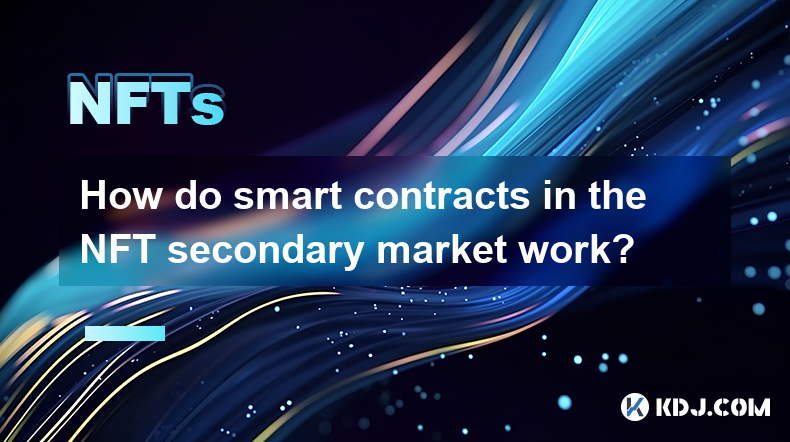
How do smart contracts in the NFT secondary market work?
Apr 03,2025 at 07:14am
Smart contracts play a pivotal role in the NFT secondary market, facilitating seamless transactions and enforcing predefined rules. These self-executing contracts with the terms of the agreement directly written into code are stored on the blockchain. In the context of NFTs, smart contracts automate the buying, selling, and transferring of digital asset...
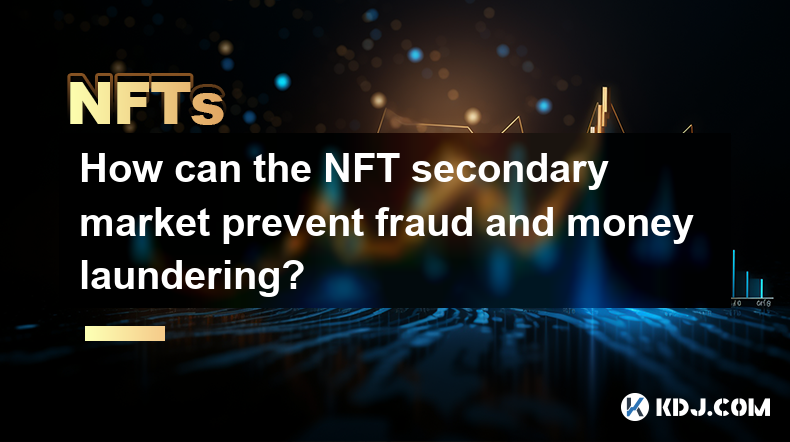
How can the NFT secondary market prevent fraud and money laundering?
Apr 03,2025 at 08:35am
The NFT secondary market has become a thriving hub for digital art and collectibles, but it also faces challenges in preventing fraud and money laundering. To tackle these issues, the market can implement various strategies and technologies to ensure a safer and more transparent trading environment. This article will explore how the NFT secondary market...
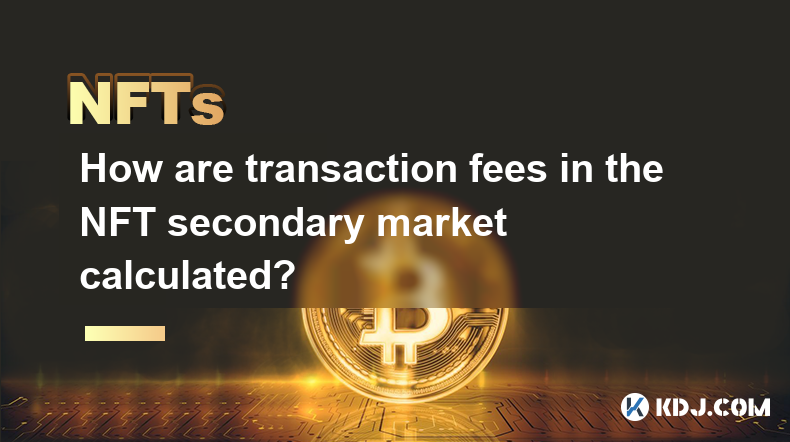
How are transaction fees in the NFT secondary market calculated?
Apr 04,2025 at 05:28am
The calculation of transaction fees in the NFT secondary market is a crucial aspect that both buyers and sellers need to understand. These fees can significantly impact the overall cost of transactions and the profits that sellers can make. In this article, we will delve into the various components that make up these fees, how they are calculated, and w...
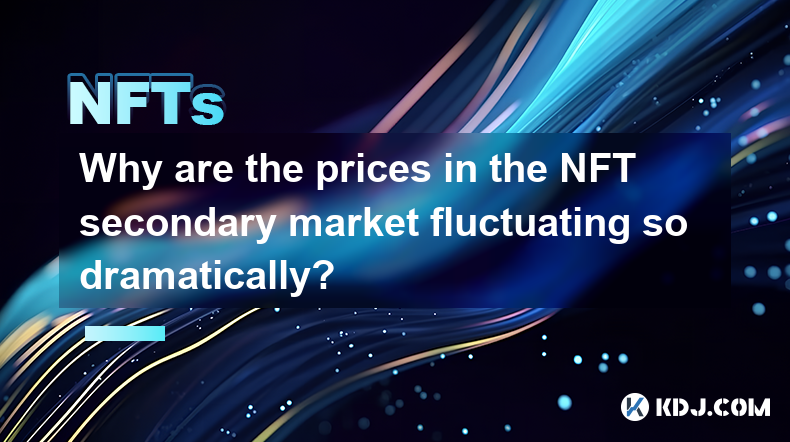
Why are the prices in the NFT secondary market fluctuating so dramatically?
Apr 03,2025 at 10:35pm
The NFT secondary market has been experiencing dramatic price fluctuations, leaving many in the cryptocurrency community puzzled and curious. To understand this phenomenon, it's essential to delve into the factors driving these price movements. From the impact of market sentiment and celebrity endorsements to the role of speculation and the unique natur...
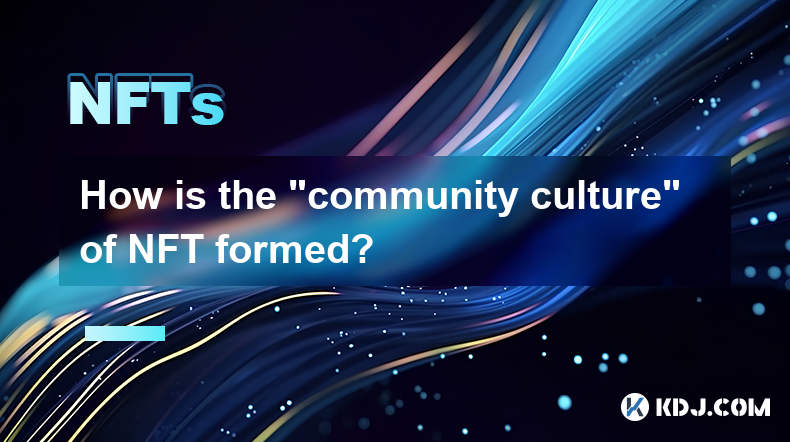
How is the “community culture” of NFT formed?
Apr 03,2025 at 11:07am
The formation of the 'community culture' within the NFT (Non-Fungible Token) space is a fascinating and multi-faceted process. It involves various elements such as shared interests, active engagement, and the creation of a sense of belonging among members. NFT communities often revolve around specific projects or artists, fostering a unique environment ...
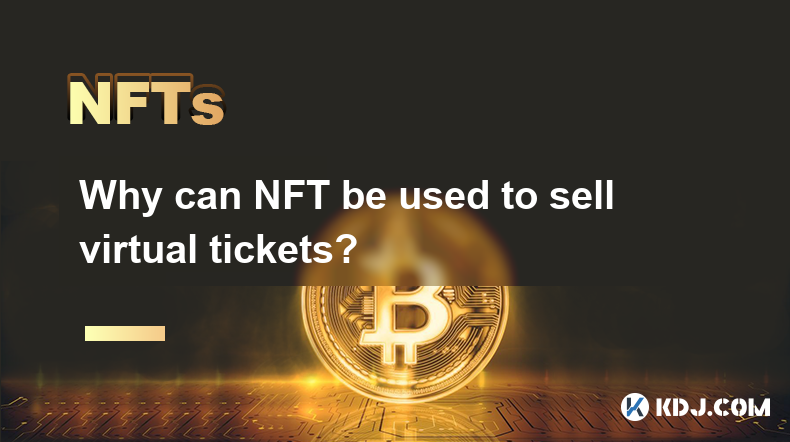
Why can NFT be used to sell virtual tickets?
Apr 03,2025 at 01:35pm
NFTs, or Non-Fungible Tokens, have revolutionized the way we think about digital ownership and value, particularly in the realm of virtual tickets. The primary reason NFTs can be used to sell virtual tickets is their unique nature. Unlike cryptocurrencies such as Bitcoin or Ethereum, which are fungible and can be exchanged on a one-to-one basis, NFTs ar...

How do smart contracts in the NFT secondary market work?
Apr 03,2025 at 07:14am
Smart contracts play a pivotal role in the NFT secondary market, facilitating seamless transactions and enforcing predefined rules. These self-executing contracts with the terms of the agreement directly written into code are stored on the blockchain. In the context of NFTs, smart contracts automate the buying, selling, and transferring of digital asset...

How can the NFT secondary market prevent fraud and money laundering?
Apr 03,2025 at 08:35am
The NFT secondary market has become a thriving hub for digital art and collectibles, but it also faces challenges in preventing fraud and money laundering. To tackle these issues, the market can implement various strategies and technologies to ensure a safer and more transparent trading environment. This article will explore how the NFT secondary market...

How are transaction fees in the NFT secondary market calculated?
Apr 04,2025 at 05:28am
The calculation of transaction fees in the NFT secondary market is a crucial aspect that both buyers and sellers need to understand. These fees can significantly impact the overall cost of transactions and the profits that sellers can make. In this article, we will delve into the various components that make up these fees, how they are calculated, and w...

Why are the prices in the NFT secondary market fluctuating so dramatically?
Apr 03,2025 at 10:35pm
The NFT secondary market has been experiencing dramatic price fluctuations, leaving many in the cryptocurrency community puzzled and curious. To understand this phenomenon, it's essential to delve into the factors driving these price movements. From the impact of market sentiment and celebrity endorsements to the role of speculation and the unique natur...

How is the “community culture” of NFT formed?
Apr 03,2025 at 11:07am
The formation of the 'community culture' within the NFT (Non-Fungible Token) space is a fascinating and multi-faceted process. It involves various elements such as shared interests, active engagement, and the creation of a sense of belonging among members. NFT communities often revolve around specific projects or artists, fostering a unique environment ...

Why can NFT be used to sell virtual tickets?
Apr 03,2025 at 01:35pm
NFTs, or Non-Fungible Tokens, have revolutionized the way we think about digital ownership and value, particularly in the realm of virtual tickets. The primary reason NFTs can be used to sell virtual tickets is their unique nature. Unlike cryptocurrencies such as Bitcoin or Ethereum, which are fungible and can be exchanged on a one-to-one basis, NFTs ar...
See all articles




















































































